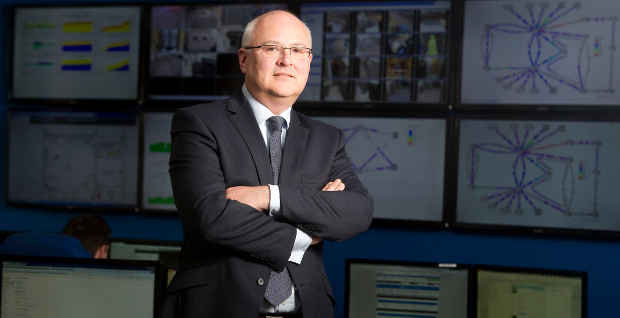Cloud Computing Is Now a Reality: Bill Strain
As a leading player in the cloud technology arena, UK-based iomart is spearheading a market movement aimed at encouraging the enterprises to embrace cloud platforms.
While RMN Digital believes that cloud is still moving with the proverbial “one step forward, two steps back” rhythm, it decided to get the expert opinion from Bill Strain who is the Chief Technology Officer of iomart Group and an enterprise technology specialist.
Here is what Bill said in an exclusive interview with Rakesh Raman, the managing editor of RMN Digital.
1. Is cloud computing still rhetoric or has it become a reality?
Cloud computing is very much a reality. Having spent the last few years listening to people ask, ‘What is the cloud?’ I now hear people ask, ‘How will the cloud benefit my business?’
I don’t think Gartner (a tech market research company) is far wrong when it predicts that by 2016 cloud computing will take up the bulk of new IT spending. The data we are creating and the increasingly flexible and mobile ways in which we work is driving the shift to the cloud and I can’t see it slowing down anytime soon.
Despite initial scepticism about the security of the cloud, at iomart we are seeing more enterprise organisations grasping the scalability and flexibility it offers and using it to deliver certain services within their overall IT infrastructure.
Infrastructure as a Service, Platform as a Service, Software as a Service – these are all terms that are now widely used and widely accepted and they mirror the way businesses and organisations are now consuming services via the internet.
As the UK Home Secretary Theresa May commented when she opened our newly expanded data centre in Maidenhead, Berkshire, recently, “It is interesting to see that the cloud has a physicality to it and isn’t just something up in the ether.”
The challenge for us is to get Governments, businesses and individuals to better understand how they can use the cloud to enable them in their daily lives.
2. What is the incentive for enterprises to replace their traditional data centers with cloud data centers?
We need to make it clear from the outset that the cloud resides within the traditional data centre.
I think this question really refers to the benefits that your business gains from outsourcing or ‘outhousing’ all or certain elements of your IT infrastructure to an external third party.
The cloud option, like any other business outsource model, provides a range of incentives such as reduced costs, access to highly trained experts, technology refreshes and business agility, all governed by an enforceable service level guarantee.
I think therefore that instead of talking about incentives it’s better to talk about what business case there is for a move to the cloud because it very much depends on how you think your organisation could benefit by such a move.
In general terms the cloud can help if you need to stabilise existing infrastructure within a secure and highly available data centre; you need to simplify your existing infrastructure; or you need to cope with projected and non-projected surges in infrastructure demand.
The teams who manage and operate data centers have a huge amount of expertise with a wide range of technologies. If you choose the right cloud provider you will get guaranteed 24/7 technical support which you might not have in your own team. Plus, you’ll have the benefit of any issues that do crop up being fixed before you even get to know about them.
And, of course, you are being provided access to Tier 1 infrastructure which can prove beyond the reach of many enterprises to replicate for a variety of reasons.
There are other business benefits too. The cost is not CAPEX but OPEX which can have positive budgetary implications. You can also save on man-hours – for instance, using cloud storage and backup means you don’t have to allocate staff to time-consuming jobs such as changing and archiving tapes.
3. Is it possible for enterprises to protect their investment in the existing IT infrastructure while adopting the new cloud computing models?
Yes absolutely. There is no ‘all or nothing’ way with the cloud. Instead cloud offers the enterprise a whole range of options to suit its business needs, from hybrid cloud (a combination of on and off premise IT architecture) right through to pay-as-you go licensing models for hosted desktops. The hybrid arrangement that combines on and off premise is already becoming a popular option.
There are probably always going to be some services you can take on-demand such as your email and backup while others which involve mission-critical legacy systems or have specific security requirements which the enterprise will be wary of taking out of its own environment. But even that is likely to change as wider adoption of the cloud by enterprise continues.
4. It is believed that most CIOs do not fully understand the benefits and implications of cloud deployment. How do you propose to convince such CIOs so they could adopt cloud?
I think most CIOs do understand the cloud and its benefits. I think the issue is more around apathy and the ‘do nothing’ approach. It is often easier to maintain the status quo than engage with new technologies and work practices. However, I think we are witnessing a change in attitude.
For many enterprises, the CIO is now viewed as a key business leader with responsibility for translating strategic direction into actionable results and competitive business advantage, whilst transforming an organisation’s IT capabilities. As the economy becomes ever reliant on technology, so CIOs must be adaptable and flexible to ensure their businesses thrive.
So I’m not sure we need to convince CIOs of the benefits of cloud, rather we need to be able to help them select the solutions and the trusted partner to deliver them once the decision has been made to move to the cloud.
5. Information security and data ownership are among the main irritants that go against cloud technologies. How does iomart address these issues? Do you have a formal SLA (service level agreement) for enterprise buyers?
Concern about security is one of the key barriers to the adoption of cloud services but if you select a cloud provider properly and do your research it shouldn’t be. For instance, at iomart we provide SLAs that guarantee 100% business uptime. You might think it is risky because all technologies can fail but the key question to ask is ‘what does your cloud supplier do when something goes wrong?’ The SLA makes the cloud provider accountable and essentially punishable if they don’t live up to their billing.
An SLA will address important questions like where your data is being held. Some cloud service providers (CSPs) might actually outsource infrastructure or support to a data centre that’s not in the country in which they are based – if that’s the case how does that affect your own legal compliance? Also, does your cloud provider have ISO accreditation against which its delivery standards can be judged? One of the key things the cloud can help with is implementing security compliance or a business continuity plan because it enables you to meet key regulatory requirements such as PCI or ISO standards.
Above all, you have to be sure you can trust your CSP to deliver what it says it will deliver in the way that you want it to be delivered.
6. What are iomart’s offerings for enterprises and how are these different from other tech vendors?
Our strengths around the delivery of both cloud and managed services for enterprise organisations focus on our core physical infrastructure and our technical expertise. In simple terms, we supply the ‘picks and shovels’ of the internet.
Offering true cloud services to corporates requires extensive infrastructure, whether it be multiple data centres, storage or network, and having a dedicated fibre network and data centre estate provides iomart with a unique selling point.
We have invested in owning and operating our own data centers in the UK plus a fast, high-capacity dark fibre network to connect them. This means that we can take our network right up to our customers’ front door. We can scale our capacity to deliver up to 4TBits of data per second.
We continue to invest in the latest technology and have just completed a multi-million pound extension to one of our data centres which allows us to provision customer services on-demand with little or no human intervention. All this has been achieved by building up trusted partnerships with leading technology vendors like EMC, VMware, Microsoft, Dell and Corning.
7. As new-generation digital, mobile, and social technologies are poised to dominate the tech world, what message do you have for traditional CIOs who are almost stuck in the Stone Age?
There is another leadership role that has arisen in many organisations in recent years and it’s that of the Chief Digital Officer (CDO). In many companies, “digital” is a cacophony of disconnected, inconsistent, and sometimes incompatible activities and the fear for the dinosaur CIO is that they may see their role subsumed, such is the importance of technology to today’s business. So the modern CIO needs to adapt and drive the digital side of the business as well as purely manage the traditional IT infrastructure.
With this move to digital comes the mantra of being ‘always on.’ We are creating so much data as individuals and organisations that we need to harness the expertise of others to analyse, manage and store it. EMC recently published its ‘Digital Universe Report’ 2014 in conjunction with the International Data Corporation which said that 90% of all the data in the world has been generated over the last two years and will continue to double every two years from now.
That’s a heck of a lot of data that needs looking after. We can’t keep building data centers otherwise we’ll never see the ground again. So we must embrace the cloud and virtualisation technologies that can help us cope with this exponential rise in ones and zeros.
Bill Strain (pictured above) is the Chief Technology Officer for leading UK cloud company iomart Group plc, and is an expert on infrastructure and software. Prior to joining iomart, Strain developed Netintelligence, the first centralised network based technology to detect threats and malware across a corporate network. He is a previous winner of IT Pro’s IT leader of the Year Award.
This interview is published under the RMN Digital’s “Thought Leaders” series in which top tech market leaders of the world express their views on different burning issues and market trends.














